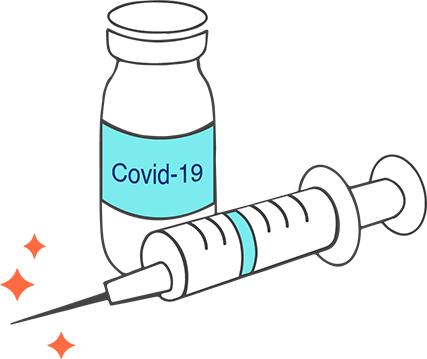What to Ask Your Rheumatologist About the COVID-19 Vaccine
Rheumatologists and public health experts are urging most rheumatic disease patients to get vaccinated as soon as they can. If you have concerns, consider discussing these questions with your doctor. Below is some general background information. Your doctor can review these issues for your personal situation.

1. Should I get a COVID-19 vaccine even though I have rheumatoid arthritis or another autoimmune or inflammatory condition?
Beyond known allergies to vaccine components, guidance from the American College of Rheumatology (ACR) says that there are no known additional contraindications to COVID-19 vaccine vaccination for patients with autoimmune inflammatory rheumatic diseases (AIIRD). In fact, it is likely a greater risk to your health not to get the vaccine.
2. I’ve been going through a disease flare. Is it still safe to get the vaccine?
The ACR guidance does not recommend delaying the COVID-19 vaccine based on disease activity and severity in most cases. There may be some unique situations in which your doctor recommends waiting if you’re experiencing a severe flare (typically involving hospitalization) or temporarily on high levels of IV steroids (which may blunt your body’s immune system’s response to the vaccine). In most cases, it’s better to get the vaccine as soon as it becomes available rather than waiting for an uncertain amount of time for your disease activity to improve.
3. Could the vaccine cause my disease to flare?
The ACR guidance notes that there is a theoretical risk of a disease flare or worsening following the COVID-19 vaccine. However, many patients with rheumatic disease have already received the COVID-19 vaccine, and there are no clear indications that it has led to flare issues. The vaccine may have side effects that resemble some characteristics of a disease flare, such a fatigue, malaise, or low-grade fever.
That said, even if the vaccine were to cause a disease flare, it’s more important to be protected against COVID-19. Getting infected with COVID-19 could also cause a disease flare as well as many other health issues, including life-threatening complications.
4. Is it still safe to get the vaccine if I’ve had reactions to a biologic infusion/injection?
You should be able to get the COVID-19 vaccine even if you’ve had reactions to a biologic infusion/injection. That’s because the CDC considers only two things to be a contraindication to the COVID-19 vaccine:
- Severe allergic reaction (e.g., anaphylaxis) after a previous dose or to a component of the COVID-19 vaccine (such as PEG or polysorbate)
- Immediate allergic reaction of any severity to a previous dose or known (diagnosed) allergy to a component of the vaccine
Having an allergic reaction to an injectable therapy, such as a biologic drug, is considered a precaution, not a contraindication, to getting vaccinated.
5. Should I temporarily stop taking my immunosuppressant medication?
The ACR guidance does not recommend making changes to most rheumatic disease medication regimens. There are a few medications, examples being methotrexate or rituximab, where it may be helpful to hold doses OR trying to time when you get the vaccine so it occurs at a certain point during the course of your treatment. This should be done under the guidance of your doctor and will depend on your disease activity and other factors. Review your medications with your doctor and discuss the best strategy for you.
6. Does it matter which vaccine I get?
The most important factor is that you get vaccinated — not which vaccine you get. Most people will not have a choice as to which vaccine they get, and experts do not recommend waiting to get one vaccine over another. Get what’s first available to you.
This resource was made possible with support from AbbVie, Inc.
